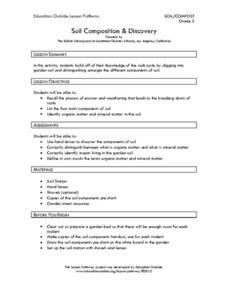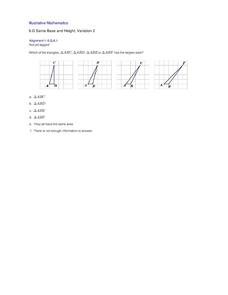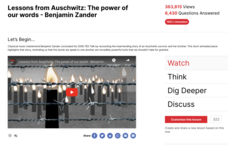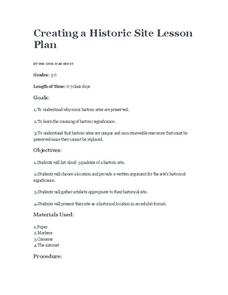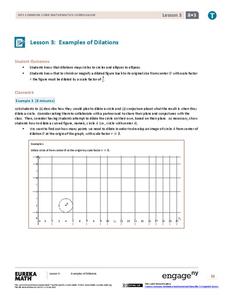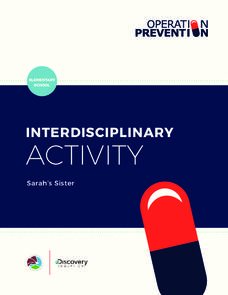K20 LEARN
Watch Your Tone: Tone Analysis Through Music And Nonfiction
Identifying the tone of a piece of writing or the author's attitude toward the subject matter can be difficult for learners. Simplify the process with a lesson plan that begins with skits, moves to songs and their lyrics, and then to...
Anti-Defamation League
Dolls Are Us
Representation matters! A lesson examines the looks of dolls and discusses whether the design is inclusive or not. Scholars create a paper doll representing a characteristic about themselves or highlights another diverse quality....
Steinhardt Apps
Kinetic Molecular Theory
Building off young chemists' knowledge of the states of matter, kinetic molecular theory is the focus of the unit. Eight days of lessons including multiple demonstrations, one lab experiment, directed instruction, and worksheets,...
K12 Reader
It’s Elemental
This comprehension learning exercise provides readers with an article about basic matter and then asks them to use this information to respond to a series of comprehension questions.
Agriculture in the Classroom
Six Kinds Do It All
Teach young engineers that all machines, no matter how complicated or complex, are made up of just six simple devices with this hands-on physical science lesson. Using the included templates, students first create paper models of...
Teach Engineering
An Introduction to Air Quality Research
Viewers are a PowerPoint are exposed to the idea that pollutants are in more than just the air we breathe. the presentation provides information about the layers of the earth's atmosphere and takes a look at the pollutants in the...
Urbana School District
Light
You matter, unless you multiply yourself by the speed of light ... then you energy. Presentation covers the behavior of light as both a wave and a particle, light versus sound, space travel, why objects have colors, depth perception,...
American Museum of Natural History
What is Astronomy?
Go study the universe. Pupils learn seven aspects about astronomy and astronomers. They begin to learn about constellations; distance and motion between objects; gravity; the electromagnetic spectrum; dark matter and energy; and teams of...
TED-Ed
How Does Your Brain Respond to Pain?
Zap! Ouch! That hurts! But why? And how come people don't experience or respond to pain in the same way? Take a journey on the sensing pathway, from your nociceptors, along your nerves, up your spinal cord, to neurons and glial, through...
Education Outside
Soil Composition & Discovery
Organic or mineral? How does the matter matter? Second graders use their knowledge of the rock cycle to label the different components in garden soil.
West Contra Costa Unified School District
Indefinite Integrals
The inverse of matter is anti-matter, so the inverse of a derivative is an antiderivative. The lesson introduces antiderivatives and indefinite integrals to the class along with the notation for integrals. Groups work together to find...
Illustrative Mathematics
Same Base and Height, Variation 2
This is a good model for learners to visualize triangles of the same base and height. They can can begin to comprehend that these triangles will have the same area no matter how the triangle is drawn. It is part of a series of resources...
TED-Ed
Lessons from Auschwitz: The Power of Our Words
Some words are best left unspoken. Words matter, according to Benjamin Zander, conductor, teacher, and lecturer. To illustrate his point, Zander recounts a story told to him by a survivor of Auschwitz. As a result of her experience this...
Fun Music Company
Working Out the Key
"Gimme an E minor!" Or any key for that matter. But how do you figure out the key of a piece of music? Here's a worksheet that shows young musicians three easy steps to help them identify the key of a piece of music.
Fun Music Company
The Bass Clef
Every Good Boy, and girl for that matter, will do just fine with this activity as they are asked to correctly trace and then draw bass clefs on the provided activity.
Benjamin Franklin High School
Saxon Math: Algebra 2 (Section 9)
Section 9 of the 12 linked Saxon Math sections introduces the young algebrist to graphing periodic functions, creating graphs from quadratic roots, working with inequalities, and rational equations. Common among all the lessons is the...
Civil War Trust
Creating a Historic Site
A historic site marks a place where a relevant historical event occurred, no matter how many people know about it. Small groups choose their own historical sites, including a place where a class member was born, or even a football field...
Teach Engineering
Solar Angles and Tracking Systems
The sun will continue to rise in the east and set in the west, no matter what. The first lesson in a series of eight introduces the class to solar angles. It makes connections between a person's latitude and the angle of position of the...
EngageNY
Examples of Dilations
Does it matter how many points to dilate? The resource presents problems of dilating curved figures. Class members find out that not only do they need to dilate several points but the points need to be distributed about the entire curve...
National Institute of Open Schooling
Chemical Equilibrium
Le Chatelier's interest in thermodynamics and building materials such as cement and plaster led to the Le Chatelier Principle in 1884. Activity 13 in a series of 36 extensively explores chemical equilibrium. Learners read about...
CK-12 Foundation
Combinations: Making the Team
Determine how many three-player teams you can make from five players. Pupils drag dots representing players to create a list of teams they can form with a limited number of players. They then find out the number of teams one individual...
CK-12 Foundation
Blood Types
Does your blood type matter? The video explains the four main blood types and the importance of knowing blood types when performing transfusions. The interactive reviews the information with a quick graphic organizer and questions.
Fluence Learning
Writing an Argument: Free Speech
How do you assess whether pupils have mastered certain concepts and skills? Designing a performance task that asks learners to demonstrate their skills and providing writers with a rubric that identifies these skills and provides...
Discovery Education
Sarah's Sister
Does it matter where medication is stored in your home? Absolutely. The best way to identify proper and improper storage of medications is to participate in different role-play scenarios. A lesson models the safe storage of medications...
Other popular searches
- States of Matter
- Properties of Matter
- Physical Science Matter
- Phases of Matter
- Conservation of Matter
- Classification of Matter
- Science Matter
- Matter and Atoms
- Physical Properties of Matter
- Composition of Matter
- Cycles of Matter
- Changes in Matter











